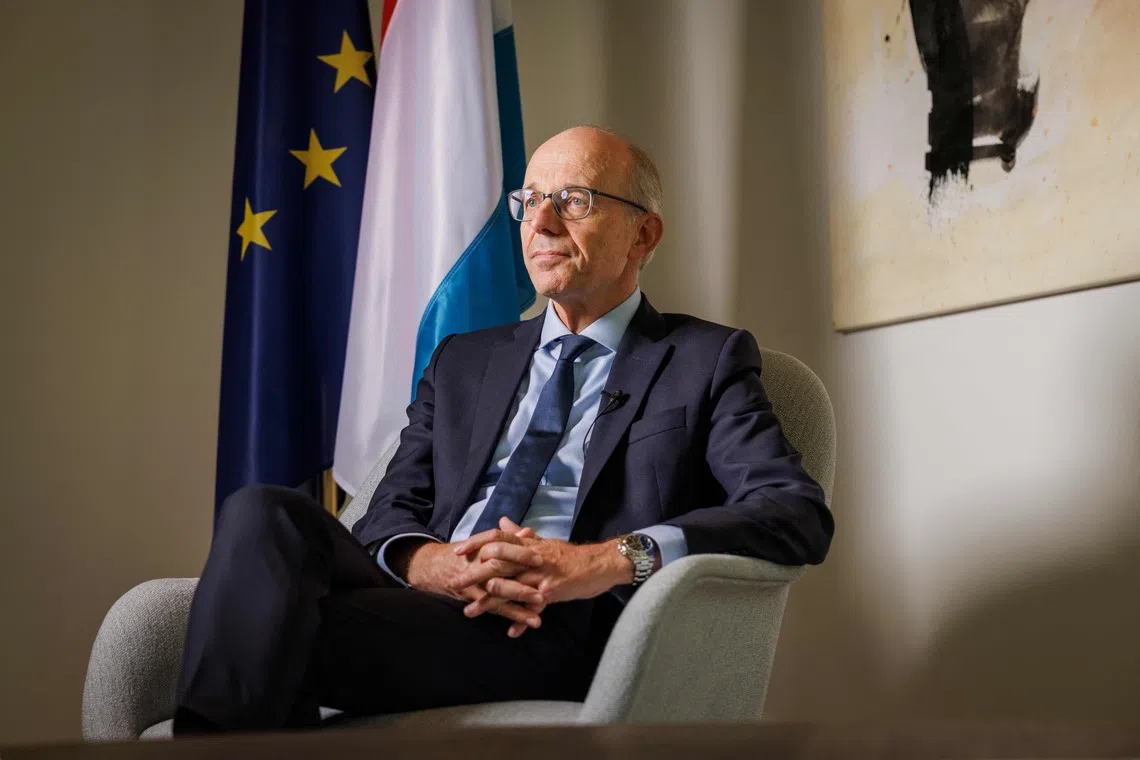Recognising Palestinian state ‘key’ for peace, Luxembourg PM
Sign up now: Get ST's newsletters delivered to your inbox

Luxembourg’s PM Luc Frieden said: “I would like the Israeli and Palestinian peoples to keep hope alive that one day they will be able to live in peace.”
PHOTO: AFP
LUXEMBOURG – Recognising a Palestinian state will help keep alive the peace process in the Middle East, Luxembourg’s prime minister told AFP as his country prepares to take the step next week.
Of the United Nations’ 193 member states, 147 already recognise a Palestinian state, but none of the Group of Seven major economies did so until now.
The Luxembourg Grand Duchy is among a raft of nations including Australia, Belgium, Canada, France and Britain that plan to join their ranks at a UN summit in New York on Sept 22.
“I would like the Israeli and Palestinian peoples to keep hope alive that one day they will be able to live in peace,” Luxembourg’s Prime Minister Luc Frieden said in an interview.
The recognition will be “a key moment in this process... an important step in a long march towards peace and stability in the region”, said the 62-year-old centre-right leader, who will be in New York to represent his country.
Starting from Sept 22, Saudi Arabia and France will co-chair UN meetings on the future of the Israeli and Palestinian two-state solution, which aims to see both sides existing alongside one another in peace.
The initiative has gathered momentum amid growing global protests at Israel’s actions in Gaza.
The war was sparked by Palestinian Islamist group Hamas’s October 2023 attack on southern Israel, which resulted in the deaths of 1,219 people, most of them civilians, according to an AFP tally of official figures.
Israel’s retaliatory campaign has killed at least 64,964 people, also mostly civilians, according to figures from the territory’s health ministry that the UN considers reliable.
The humanitarian crisis triggered by Israel’s campaign and restrictions on aid have fuelled widespread public anger in Europe and elsewhere.
A United Nations probe has accused Israel of committing “genocide”
Last week, the General Assembly overwhelmingly adopted a text
“We will see on Monday what the Arab countries have to say. The fact that they condemn Hamas is new. Hamas must go and Arab countries must help us to achieve this,” Mr Frieden said.
Israeli Prime Minister Benjamin Netanyahu has insisted “there will be no Palestinian state” and his government maintains that recognising Palestinian statehood would destabilise the Middle East and reward Hamas.
The United States, Israel’s main ally, has also opposed recognition and denied US visas to the Palestinian delegation to the UN.
Mr Frieden said: “Everything we do is not against the Israeli people but is intended to stop the atrocities we are seeing in Gaza.”
Luxembourg, one of the European Union’s founding members, supports proposed EU sanctions against Israel including curbing trade ties, he added.
“If they don’t listen to us, unfortunately we will have to move towards sanctions,” he said of Mr Netanyahu’s government. AFP


